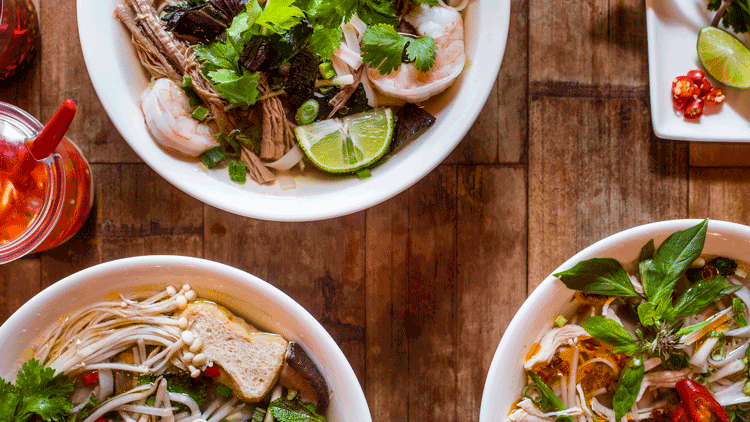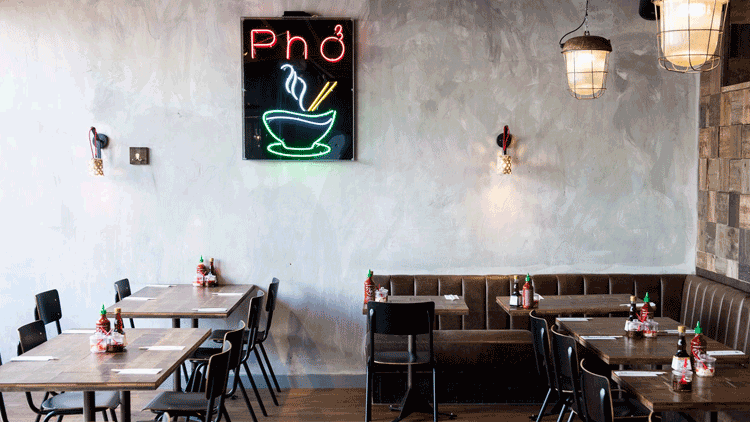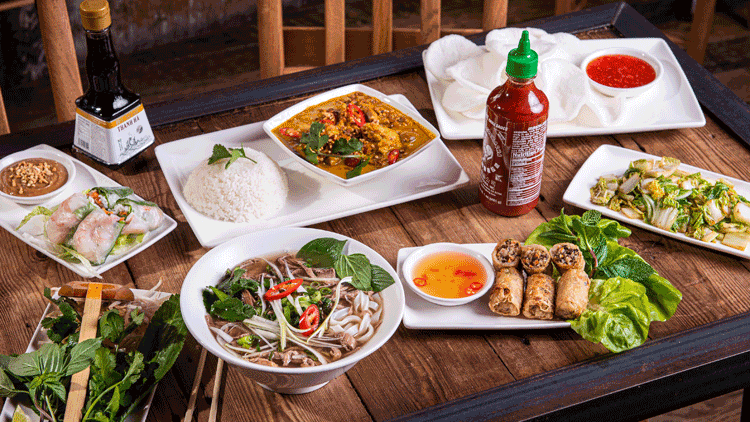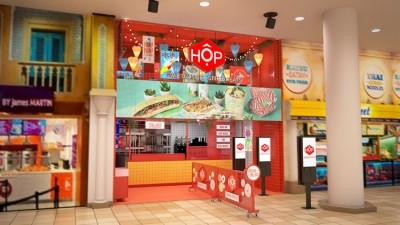Vietnamese whirl: the rise of Pho
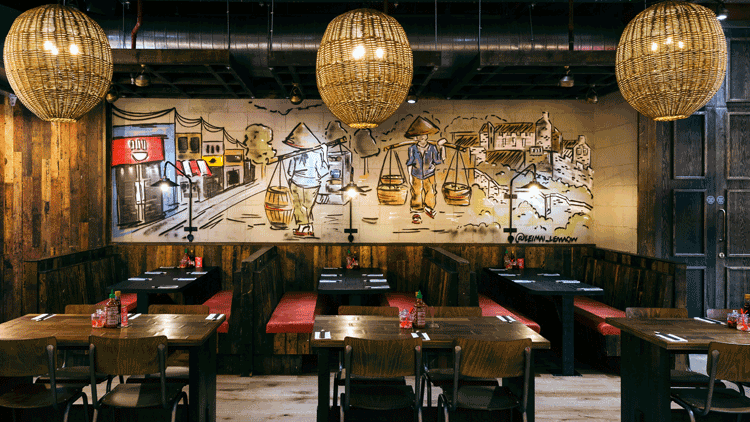
Pho founder Stephen Wall is a hard man to track down. Or at least to interview. When he and Pho managing director Patrick Marrinan finally get to sit down to discuss business it’s after not one but three failed attempts.
Our first interview was scheduled for July, a date that was mysteriously cancelled last minute for reasons that would soon become clear (the other two aborted meetings involved time constraints and Southern Rail). Then, a month later it was announced that private equity firm TriSpan had acquired a significant majority stake in Pho, with Wall delaying our conversation so that he was able to talk about the deal.
It’s not difficult to understand what TriSpan saw in Pho. With 31 restaurants it is the UK’s biggest Vietnamese restaurant chain and one of its largest Asian groups and yet there’s plenty of scope to double its reach; its product is sound - 16 years on and the group still cooks everything fresh in every single site, from its Vietnamese salads and soups to curries and noodles - and with an average spend of £16 it occupies the current sweet spot of the sector.
And then there’s its affable owners Stephen and Juliette (Jules) Wall, a nicer couple in the industry you won’t meet. There’s definitely something about Pho.
Survival of the pho-test
Like every hospitality group, the past 18 months have been tough and TriSpan’s investment, for an undisclosed sum as part of its Rising Stars restaurant fund, will not only have been an invaluable fillip for the business but a reassurance about its future. By and large the company has weathered the Covid storm well, but it is still not yet business as usual.
The group is yet to reopen its Covent Garden and Great Titchfield Street restaurants because of a lack of staff that is being felt across the sector. “If we were to open Covent Garden tomorrow Soho would suffer,” says Wall. “We don’t want to have to pull staff from other places, we have to have a fully staffed restaurant so as not to be a drain on the others.”
In the capital Pho has what it calls central, suburban and outer London locations. Suburbia was its lifeline during the pandemic (“delivery has gone absolutely mental there”) with outer London coming good following the lifting of lockdown. Central London, by contrast, is still playing catchup. “It’s got a way to go. If you go to Cheapside, you can probably have a game of cricket on the street at certain times of the day.”
The group’s only other restaurant to remain closed is its One New Change site, but that’s down to of a lack of footfall rather than staff, according to Wall. Landlord Landsec, from which the company rents four restaurants, is understanding. “They are really good. Landlords like them will come to table, they get it.”
Good landlord relationships
The pair say that the vast majority of Pho’s landlords have been good to work with. “It started off with the smaller mom and pop landlords that were amazing, for our restaurants such as Spitalfields, Islington, and Ealing,” says Wall. “Then the big landlords, which tuned out to be great, but it took them a little longer to work out they needed to help us.”
Not all have been cooperative though. “The majority eventually came back to the table with an understanding,” says Marrinan. “We had a couple who had zero interest, who knew the law was on their side at that time and demanded we just pay up.
“One particular landlord wanted to take us down and we knew from recent deals this could be the case,” adds Wall. “We knew they were going to be very, very difficult.”
The group has a number of rent reviews outstanding and will soon be engaging with them to know where it stands. “Will a landlord look at the buoyant bounce back in certain areas and ask for an uplift in rent or will they get real about the [longer-term] situation?” says Wall. “It’s not really worked itself through yet.”
“We have got to what we would call a fair position overall,” adds Marrinon. “But we are conscious that while we want the best deals, we’ve also got relationships for the next 20 years on some landlords, so we need to be realistic.”
A healthy sense of realism
A sense of realism, and a pragmatism, is something that has underpinned Pho’s approach from its very beginnings when it launched in London’s Clerkenwell in 2005. Growth over the past 16 years has been conservative; with an estate of 31 restaurants plus three Deliveroo Editions dark kitchens, Pho’s average rate of openings sits at just under two restaurants a year, a speed some in the casual dining sector would consider glacial.
“We certainly have been conservative, but if you factor the three years between St John Street and restaurant number two then it’s only a 13 year-period. Then take two years off for Covid and its even less, but it’s still only three of four sites a year tops.”
Back then Pho’s backer Gresham House was on the same page in terms of expansion. “Gresham completely trusted us; they did not want us to churn out sites for the sake of it. If we see sites we like we’re going to open them if they make financial sense; in one year that could be five, the next maybe two, and in the main they were understanding about that.”
It hasn’t always been this steady. Wall admits to having had a “hiccup” a few years ago and says the company made a point of stopping the pipeline for a couple of years to focus on quality. “We did need to pull our pants up across the board,” is his appraisal.
In that period the company had a bit of a growth spurt, opening five or six within a 12-month period. All were profitable but the structure wasn’t in place to support them, resulting in Pho becoming a “little flabby,” according to Marrinan, who joined the company in 2017 as finance director before becoming managing director in August this year as part of the TriSpan deal.
“The good thing about the founders (Stephen and Jules) is they don’t hang around when taking action. It was resolved pretty quickly, and you could see that in the bounce back (the company saw EBITDA rise from £2m to £3.2m on the same estate following its changes).
It’s an approach that has undoubtedly reaped rewards. While some hospitality businesses have been forced into restructuring and CVAs during the pandemic in a bid to offload unperforming sites locked into high rental agreements, Pho has been able to hold onto all of its restaurants.
“One thing that has come out of the pandemic is how happy we are that we’ve never done stupid rent deals,” says Wall. “We have started to look at one or two sites towards the top end of what I’m personally comfortable with, but the vast majority of our rent is OK, we’ve not overpaid. And thank god for that. The way we’ve approached things is to pay a fair rent rather than think ‘what a great site we’ll pay whatever it takes’ – which might be the way with some companies.”
During its 16 year-life the company is also yet to close a restaurant, a fact that Wall sees as a vindication for its measured approach to expansion. This will change next year when the original Pho, which only has a year left on its lease, will close but only because the company has outgrown the 28-cover restaurant.
“One thing that has come out of the
pandemic is how happy we are that
we’ve never done stupid rent deals"
“I don’t call that a closure,” says Walls with a shrug. “We’ve had it 16 years, but it just doesn’t fit in any shape or form anymore. We’ve never had a failed site.”
It is this track record that will have no doubt attracted TriSpan to the table. In August, the private equity firm acquired a significant majority stake in Pho as part of its Rising Stars restaurant fund, with Robin Rowland, TriSpan’s European operating partner, appointed as chair of the board with Steve Hill, current chairman, remaining on the board as a non-executive director.
Pedal to the floor
It is this track record that will have no doubt attracted TriSpan to the table. From an outsider’s view it would seem that the private equity firm, which also invests in fried chicken brand Thunderbird, Rosa’s Thai, Rosa Mexicano and Yardbird would have eyes on speeding up Pho’s rate of expansion.
Robin Rowland, TriSpan’s European operating partner, has been appointed as chair of Pho’s board with Steve Hill, Pho’s current chairman, remaining on the board as a non-executive director. Rowland’s experience with YO!, the company he joined in 1999 and was chief executive of until 2017, where he expanded the business from three London restaurants to a global brand, would also suggest this.
We will speed up openings,” Wall accepts. “As a new business partner, we don’t want them to massively alter what we want to do but yes, we will be looking to accelerate to six sites or so a year. And they will come like buses. We won’t open one in March, then another in May and another in July, it doesn’t happen like that. They have got to be in the right areas; we are not going to do sites by numbers.”
Pho’s opening rate has already stepped up, with four sites to open in six months, but this is down to restarting plans laid down before lockdown rather than TriSpan’s influence. Two of these have already opened, in Lincoln and Edinburgh, with restaurants in Nottingham and Cheltenham pending. Wall says he is also now more active in site selection, recently stopping over in York on the way back from Edinburgh to look at a potential site there.
Rowland’s input will be invaluable while Hill remaining on the board provides some consistency. “I’ve known Robin for many years, having him there provides comfort. He has known Pho since we were one site old, it’s vital his presence is there.
“We are not oblivious to the fact that [TriSpan] has put some fairly serious money into the company and they want to see a return on that money, but we wouldn’t have done a deal with a business we thought would go about it the wrong way. The only way we are going to all succeed is by growing the brand in the right manner. They will get the run rate they want, and we’ll keep the brand we want.”
“All deals will be done with our business plan in mind,” adds Marrinan. “We will have discussions with Trispan on what is an expected rate of growth. This business can do bricks and mortar restaurants, but our Editions additions business is also thriving so over time you can see how an acceleration can be achieved.”
A flexible future
Beyond Cheltenham and Nottingham, the company has a clear idea of other places in which it wants to grow. The Nottingham site, on which work was due to start in March 2020 before Covid hit, was an obvious one and there are still a few more areas like that, it says, including Glasgow, Bath, and York, cities with a high student population. “We do like students,” says Wall. “Me and Jules used to say our customer demographic was 25 to 39 year-old ABC professionals who were well travelled, but it’s more like 18 to-60 year-old who have maybe travelled a bit and like different food. Students play a big part in that.”
There are also plans to double up in larger cities such as Birmingham, Manchester, Leeds and Liverpool, most likely in their more suburban areas.
The pandemic has also taught the company to be flexible and reaffirmed its view to not put all of its eggs in one basket. Wall describes Pho’s 50/50 split between London and non-London sites as being its “saving grace, and it continues to be” as the pandemic wages on.
The company was looking at creating a more express Pho to Go or Pho Express format in Leeds, which it has put on hold for now, but different formats for travel hubs and shopping centres could be a thing in the future.
“We can pivot. We already have restaurants in travel hubs (in Birmingham’s Grand Central station) and food courts (Westfield Stratford), so we are set up to take a natural next step when the time is right and have been for ages. It is not the case that we need to open seven 2,500sq ft boxes a year, that’s not us. The good thing about having Robin on board is that he jolly well gets that we have to do it the right way.”
As for many other hospitality brands delivery has now become a major consideration for Pho following its success in lockdown. “We’ve learnt that delivery isn’t the devil, it was even the angel for a while,” says Wall. “But delivery has to be the icing on the cake. We can’t be going somewhere like Nottingham and thinking this site isn’t going to work if there’s no delivery market. It’s got to work regardless and then there will be delivery on top.”
Competing for sites
With another expanding brand in Rosa’s Thai in TriSpan’s portfolio, is there a worry there will be competition for sites? And if so, would TriSpan have a casting vote?
“If we both see a good site, we will have to arm wrestle for it,” jokes Wall. “In fact, Gavin (Adair, Rosa’s CEO) is quite a big guy, he’s got long levers, so maybe not.”
On a more serious note: “There is a Chinese wall - Robin is chair of both and that’s how it goes. We will go about with our site finding and they will go about with theirs and never the twain shall meet.”
And if they do want the same site? “If we’re up against them somewhere it is what it is, may the best man win. It’s got to be that way. But right now, we are quite different. Rosa’s has opened in quite a few London suburbs recently whereas we’re in Nottingham and Lincoln. There might be a time, but our sites are a bit bigger. Our average size outside of London is 3,500-4,000sq ft, Nottingham has 120 covers with 20 more outside. We are suitably different.”
That doesn’t mean London is off the cards. Walls says he will look again at the capital but that at present it is too competitive. “There are not that many amazing sites doing the rounds so we will wait and see.”
“We definitely want something ese in the centre of town, it’s been a while. But we’re not going to force it. It will happen, but we’ll do it the right way.”

